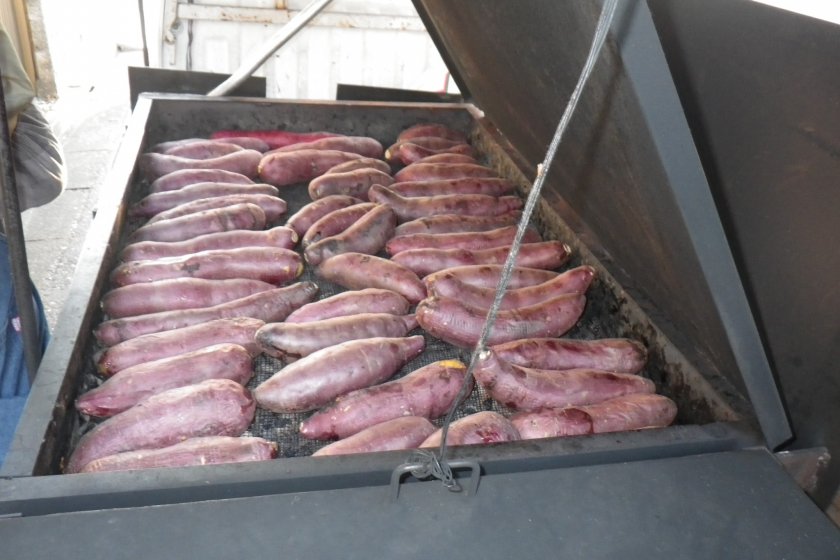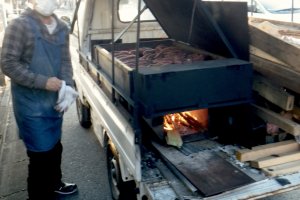A haunting call from afar, stops and starts. We were at home, in the parking area. “I think I hear him! Let`s get back in the car!” I opened all the windows. It was one of the first warm days of the year. We started driving back, towards Tobu Minami Utsunomiya Station. Our ears straining. “He must be around here,” I murmur as I park at a nearby convenience store. We sit in wait, listening. A train passes. Birds chirp. Cars pass. “Yakiiiiimoooo….” We looked at each other. “It’s him! Quick! Where is he?” I closed the windows, scrambled to get my camera, wallet and keys. We run in the direction of the refrain.
The little white truck loaded with firewood, a barrel and stove idles on a side street. The music is cut again. The aproned yaki-imo salesman smiles and greets us. Two weeks ago, we purchased two sweet potatoes from him on the same side street. He drives down that street around the same time, and he will continue to do so until the warm weather sets in, in May. I had it on my calendar to look for him around 4:30.
One sweet potato, baked over coals in the back of the small white pickup truck, costs ¥250. I fish the coins out of my wallet. The vendor lifts the lid of the oven to reveal dozens of purple sweet potatoes in their hot bed, steaming over coals. I can smell them, and I can smell the fire. He hands me my purchase and leans over to push another scrap of lumber into the furnace. The embers flame up. I hold my warm treasure in a brown paper bag to my chest. It is big enough for a family of three to share. We eat it at home with a spoon. These baked sweet potatoes have the texture and sweetness of cheesecake.
I lived in Korea before. I could buy steaming citrus tea, thick with honey and rinds, from street vendors in the winter, sweet pancakes with cinnamon sauce all year round, and candy floss and fried silk worms from mobile vendors on the beach in the summer. Thirteen years ago when I first moved to Japan, a mobile oden restaurant used to park near my apartment. We would duck into a tent attached to the side of a truck, and sit on a stool at a make-shift counter. Nowadays, we occasionally stop by a kushiyaki truck outside a nearby supermarket. A neighborood tofu man plays some kind of pipe instrument as he approaches. Other than that, the street vendor seems to be a thing of the past in Japan, except at festivals. That is one reason I love festivals in Japan - outdoor food, prepared in front of you.
Baked sweet potato is available at supermarkets, and farmer`s markets, but for me, the appeal goes beyond the sweet potato; it is the individual chance experience of meeting on the street, and in this case, the fare is good, the service friendly and the prices reasonable. Such vendors are time travelers from an older Japan, before big box stores and superhighways, when people walked the neighborhood streets more. I imagine that in the past, this type of door to door, street to street vendor was common; now the rarity of it makes me appreciate it all the more. This is one aspect of life in Japan that I cherish and hope can be experienced by generations to come.
































